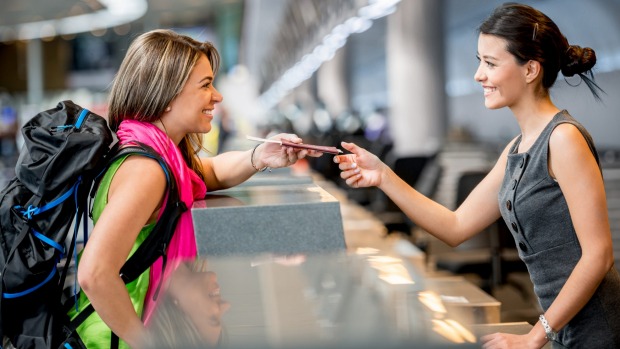
British Airways shouldn't have charged Jim Arnold and his wife $US400 ($A557) for their checked bags. After all, the couple were flying from London to Newark, New Jersey, in premium economy class. But when they tried to check in, that's what the computer demanded.
So they forked over their credit card number.
Later at the airport, a representative apologised for the glitch. "I was told that this happens all the time," says Arnold, a retired chief financial officer who lives in Bellevue, Washington. "I needed to contact customer service at British Airways for a refund."
The airline representative was right. This happens all the time. When in doubt, an airline charges for bags, because luggage has become a massive source of revenue. The domestic airlines are on track to break last year's record of $US3.5 billion in luggage fees. By comparison, domestic airlines collected only $US464 million in such fees eight years ago.
The industry is resorting to increasingly creative tactics in an apparent belief that there's still room to grow this revenue source. They include everything from simply raising luggage fees to creating complicated pricing menus that confuse customers and prodding them into participating in loyalty programs with the promise of a "free" bag in exchange for signing up for a branded credit card. Fortunately, there are ways around all of that.
First, a little more bad news: The airline industry is probably right about baggage. You and I are willing to pay more than we already are. It's still considerably more expensive to ship luggage overnight, for starters. Recent studies show baggage revenues continuing to grow aggressively. In fact, two no-frills US airlines, Allegiant and Spirit, even raised some of their fees for the holidays to take advantage of high demand. Baggage fees are so profitable that an ever increasing number of airlines are adopting them - for example, in Asia and South America, according to the studies.
For an idea of how much worse things can get, listen to what happened to Vito Valentinetti when he flew from Copenhagen to Boston on WOW Airlines, an Icelandic budget airline. "I found nearly a month after I booked the ticket that I was only allowed to bring on a single piece of carry-on luggage under 11 pounds," he says. "I could upgrade for $US38 to a single 26-pound carry-on or pay $US48 to check the bag."
Don't wait too long, the airline warned. If he tried to "upgrade" at the ticket counter, it would cost $48 and $67, respectively.
Another way airlines persuade their passengers to pay more is by making their luggage costs too complicated to understand. The resulting confusion can be expensive, as it was for Johanna Jacobson, a photographer who was flying from Los Angeles to Rome recently on Air France. The luggage fee page on the Air France website was "the most complicated chart I had ever seen," she says, "and for the life of me I could not figure out the costs."
But Air France could. Although a representative repeatedly assured Jacobson by phone that her second bag would be "free" and her third bag would cost $100 to check, the actual price came to $100 for the second bag and $285 for the third bag - a grand total of $385 that her credit card company insisted was a legitimate charge, even after she formally disputed it.
"It was completely crazy," she says.
One established method for avoiding baggage fees - apart from travelling without checked baggage - is to sign up for an airline's branded credit card. That's what Stuart Wolfe, an attorney from Irvine, California, and a frequent air traveller, does.
"One of the perks is usually free bags," he says. "The annual cost of the card is usually far less than the bag cost on a single trip."
That advice works for frequent air travellers, but branded credit cards with high fees and high interest rates don't make much financial sense otherwise. Worse, a mileage-earning credit card encourages air travellers to steer all of their business to one airline in an effort to reach an elite level, even when there are more affordable tickets on another carrier. In short, airlines are leveraging their high luggage fees to prod infrequent customers into giving them their unquestioning loyalty.
That loyalty may or may not go both ways. Consider what happened to Bennett Cherry, a college professor from San Marcos, California, who booked a flight through Delta Air Lines that was operated by KLM - called a code-share flight - believing that the hard-earned points on his American Express-branded Delta card would entitle him to free luggage.
"I was informed that my status with Delta didn't matter," Cherry says. "The cost for my baggage was over $US100 each way. Delta couldn't and didn't defend that loyalty, despite the repeated communiques to the contrary."
How do you avoid these luggage fees? Don't check a bag, if possible. If you do, consult your airline's website to make sure you understand how much it costs. Airlines actually raise their baggage prices as you check more bags, which is somewhat counterintuitive.
Some travellers take matters into their own hands.
"Whenever possible, I ship materials via overnight delivery," says Craig Conroy, an aviation expert. Sure, shipping via FedEx or UPS may be more expensive, but the convenience and the guarantee of having the luggage show up at your hotel is worth it, he says.
Or you could fly one of the last airlines (in the US) that still refuses to play luggage games with its customers, Conroy adds. You can buy a ticket on Southwest Airlines.
TNS